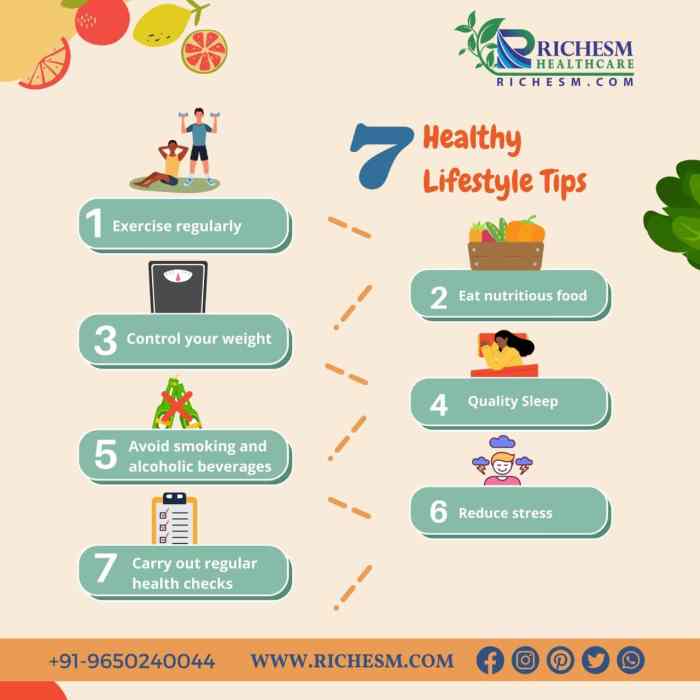Healthy Lifestyle Tips takes center stage, inviting you into a world of wellness and vitality with a cool high school vibe. Get ready to dive into the ultimate guide on living your best life through healthy habits.
Get the scoop on nutrition, exercise, mental health, sleep hygiene, and more in this hip and informative read.
Benefits of a Healthy Lifestyle
Maintaining a healthy lifestyle is crucial for overall well-being and longevity. By adopting healthy habits, individuals can experience a wide range of benefits that positively impact various aspects of their lives.
Improved Physical Health
- Regular exercise helps strengthen muscles, improve cardiovascular health, and boost immune function.
- A balanced diet rich in nutrients can prevent chronic diseases such as heart disease, diabetes, and obesity.
- Adequate hydration supports proper bodily functions and can enhance skin health.
Mental Well-being
- Engaging in physical activity releases endorphins, which can reduce stress and anxiety levels.
- Eating nutritious foods can improve mood and cognitive function.
- Sleeping well and managing stress levels are essential for mental clarity and emotional stability.
Increased Energy Levels
- Following a healthy lifestyle can lead to increased energy levels throughout the day.
- Avoiding processed foods and sugary drinks can prevent energy crashes and promote sustained vitality.
- Regular physical activity can improve stamina and overall energy levels.
Nutrition Tips for a Healthy Lifestyle
Eating a balanced diet plays a crucial role in maintaining good health and well-being. Here are some tips to help you make nutritious choices for a healthier lifestyle.
Examples of Nutritious Foods
- Fruits and vegetables: Rich in vitamins, minerals, and antioxidants, these colorful foods are essential for overall health.
- Lean proteins: Include sources like chicken, fish, tofu, and legumes to support muscle growth and repair.
- Whole grains: Opt for whole wheat bread, brown rice, and quinoa to provide fiber for digestive health.
- Dairy or dairy alternatives: Calcium-rich options like milk, yogurt, or fortified plant-based alternatives help maintain bone strength.
- Healthy fats: Incorporate sources like avocados, nuts, seeds, and olive oil for heart health and brain function.
Impact of Hydration
Maintaining proper hydration is essential for overall health and well-being. Staying hydrated helps regulate body temperature, aid digestion, and transport nutrients throughout the body. Aim to drink at least 8 cups of water per day and more if you are physically active or in hot weather.
Creating a Healthy Meal Plan
- Plan ahead: Take time to plan your meals for the week, including snacks, to ensure you have nutritious options readily available.
- Balance your plate: Aim to include a variety of food groups in each meal, focusing on portion control and nutrient density.
- Include snacks: Opt for healthy snacks like fruits, nuts, yogurt, or whole-grain crackers to keep your energy levels stable throughout the day.
- List your favorites: Make a list of your favorite healthy recipes and ingredients to help you stay motivated and on track with your meal plan.
Physical Activity and Exercise
Regular physical activity is crucial for maintaining a healthy lifestyle. It not only helps in managing weight but also reduces the risk of chronic diseases such as heart disease, diabetes, and certain types of cancer. Exercise also improves mood, boosts energy levels, and promotes better sleep.
Designing a Workout Routine
Creating a workout routine that promotes a healthy lifestyle involves a combination of cardiovascular exercise, strength training, and flexibility exercises. Aim for at least 150 minutes of moderate-intensity aerobic activity or 75 minutes of vigorous-intensity activity each week. Incorporate strength training exercises at least two days a week and don’t forget to include stretching exercises to improve flexibility.
Types of Exercises and Their Benefits
- Cardiovascular Exercise: Activities like running, swimming, and cycling help improve heart health, increase endurance, and burn calories.
- Strength Training: Lifting weights or using resistance bands not only builds muscle mass but also boosts metabolism and improves bone density.
- Flexibility Exercises: Yoga, Pilates, and stretching exercises enhance range of motion, reduce the risk of injury, and promote relaxation.
Mental Health and Stress Management: Healthy Lifestyle Tips

Maintaining a healthy lifestyle is not only beneficial for our physical health but also plays a crucial role in our mental well-being. The connection between mental health and a healthy lifestyle is evident, as what we eat, how active we are, and how we manage stress can significantly impact our mental state.
Strategies for Managing Stress Effectively
- Practice mindfulness and meditation to help calm the mind and reduce stress levels.
- Engage in regular physical activity, as exercise is known to reduce stress and boost mood.
- Establish boundaries and learn to say no to tasks or commitments that may cause unnecessary stress.
- Ensure you are getting enough quality sleep, as lack of sleep can exacerbate stress levels.
Tips for Improving Mental Well-being, Healthy Lifestyle Tips
- Connect with loved ones and build a strong support system to help cope with stress and challenges.
- Engage in hobbies and activities that bring you joy and relaxation.
- Seek professional help if needed, as therapy and counseling can provide valuable tools for managing stress and improving mental health.
- Practice gratitude and focus on the positive aspects of your life to cultivate a more optimistic outlook.
Sleep Hygiene

Quality sleep is essential for overall health and well-being. It plays a crucial role in various bodily functions, including cognitive performance, mood regulation, immune system function, and physical health. Poor sleep hygiene can lead to a range of health issues, such as increased risk of chronic conditions like obesity, diabetes, and heart disease.
Improving Sleep Hygiene
- Avoid electronics before bedtime: The blue light emitted from screens can disrupt your body’s natural sleep-wake cycle. Try to limit screen time at least an hour before going to bed.
- Create a relaxing bedtime routine: Establish a calming routine before bed, such as reading a book, taking a warm bath, or practicing relaxation exercises to signal to your body that it’s time to wind down.
- Maintain a comfortable sleep environment: Keep your bedroom cool, dark, and quiet to promote better sleep. Invest in a good mattress and pillows that support your body for a restful night’s sleep.
- Avoid caffeine and heavy meals close to bedtime: Stimulants like caffeine can interfere with your ability to fall asleep, while heavy meals can cause discomfort and disrupt your sleep. Opt for light snacks if you’re hungry before bed.
- Stick to a consistent sleep schedule: Go to bed and wake up at the same time every day, even on weekends, to regulate your body’s internal clock and improve the quality of your sleep.
Benefits of a Consistent Sleep Schedule
- Improved cognitive function: Quality sleep helps enhance memory, focus, and decision-making abilities, allowing you to perform better in school, work, or daily tasks.
- Enhanced mood and mental health: Adequate sleep can help regulate emotions and reduce the risk of mental health disorders like depression and anxiety.
- Boosted immune system: A consistent sleep schedule supports a healthy immune system, reducing the likelihood of getting sick and promoting overall well-being.
- Increased energy levels: Proper sleep hygiene ensures you wake up feeling refreshed and energized, ready to tackle the day ahead with vigor and vitality.








